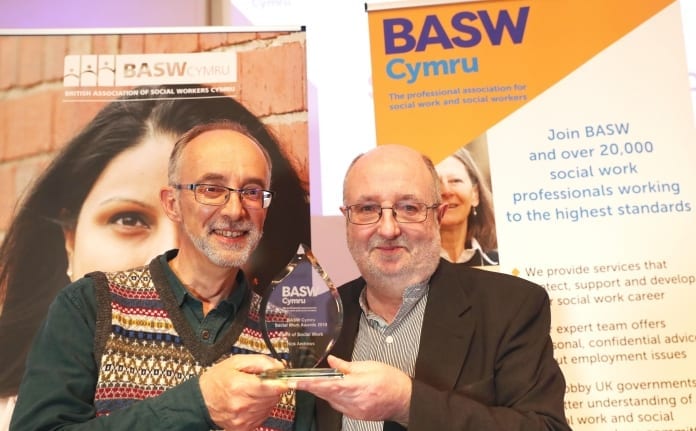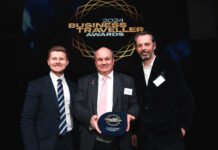
Swansea University is championing a project to bring people together in the community to share their experiences and learn from each other.
Having a chuckle, swapping stories and exchanging memories as part of a group can all have really positive benefits according to experts at the Wales School for Social Care Research, based at the University.
Nick Andrews is the School’s Research and Practice Development Officer and co-ordinates the Developing Evidence-Enriched Practice (DEEP) approach, a project aimed at building bridges between research, policy and practice in social work and social care.
Nick explained: “We work all over Wales with local authorities and community organisations and look at ways of using research to enrich people’s quality of life – whether it is staff or service users and their families and carers.
“We live in the real world and we want to dispel the myth that researchers just sit in their ivory towers studying. We want to share our research in interesting ways, using methods that will have an impact.”
Among the groups Nick and his team has been working with is the Me, Myself and I Dementia Club in Briton Ferry which provides emotional support, reassurance and a chance for people living with dementia and their families to socialise in a relaxed setting.
He explained: “We train people by inviting them to an exploratory talk, we produce a booklet and gather interested people together.”
This allows the team to pass on techniques aimed at encouraging people to share stories of compassionate care and good practice – what Nick describes as “magic moments”.
In turn, when these examples were discussed they inspired others to create their own magic moments.
“DEEP is very emergent. We don’t have a big project plan, we just look at ways to create new opportunities. Innovation is really important but its little things that often make the difference.”
For example the use of laughter: “We looked at research around how to make people with dementia feel more included and one way was through laughter which is important for social bonding.
“So we put on laughter yoga and it was a real success – so much so that the practitioner who ran the session went on to develop a toolkit for therapeutic laughter in care homes and is now working with us.”
Nick, a registered social worker who moved into research in 2013, added: “Our end game is just for people to be living a better life. It’s about kindness and appreciation.”
To help encourage others, the DEEP project invited people to donate their own stories and, with support from Welsh Government, local councils and the Joseph Rowntree Foundation, they have been turned into booklets packed with Magic Moments and suggestions for others to follow.
These include the story of a one elderly care home resident who doesn’t speak being given headphones and an iPod containing old hymns. When the hymns were played she started singing – she used to be a church organist. When sitting a table she would also use the table as if it was a piano.
The project’s work has won the backing of Older People’s Commissioner Sarah Rochira: “It is vital that we do not lose sight of just how important even the smallest of things can be to an individual, the positive difference that a magic moment can make to their life.”
Nick’s commitment to the project has led to him being honoured by the British Association of Social Workers (BASW) Cymru. At its latest annual awards he was presented with The Spirit of Social Work 2019 in recognition of his work.
“I was delighted and humbled to receive the award – I have a lovely job bringing people together and putting our research into practice – it is research to make the world a better place.”
Any community group who would like to find out more about the DEEP project and how they can get involved should get in touch with Nick.
“We are keen to build up awareness of Wales School for Social Care Research. We already have bases at Cardiff and Bangor universities but we would like to see it not only continue its good work but also expand.
“We want to share these principles with practitioners, carers and ordinary members of the public. We are eager to hear from any other groups where communities come together. Anyone can approach us – that’s the whole point.”
Arbenigwyr yn mynd allan i gymunedau i ddangos sut gall rhannu profiadau wella bywydau
Mae Prifysgol Abertawe’n cefnogi prosiect i ddod â phobl at ei gilydd yn eu cymunedau er mwyn rhannu eu profiadau a dysgu oddi wrth ei gilydd.
Gall chwerthin a chyfnewid straeon ac atgofion fel rhan o grŵp gynnig buddion go iawn yn ôl arbenigwyr yn Ysgol Ymchwil Gofal Cymdeithasol Cymru, a leolir yn y Brifysgol.
Nick Andrews yw Swyddog Datblygu Ymchwil ac Ymarfer yr Ysgol ac mae’n cydlynu’r dull Datblygu Ymarfer ar sail Tystiolaeth (DEEP), prosiect sydd â’r nod o adeiladu pontydd rhwng ymchwil, polisi ac ymarfer mewn gwaith cymdeithasol a gofal cymdeithasol.
Esboniodd Nick, “Rydym yn gweithio gydag awdurdodau lleol a sefydliadau cymunedol ledled Cymru gan edrych ar ffyrdd o ddefnyddio ymchwil i gyfoethogi ansawdd bywyd pobl – p’un a ydynt yn staff neu’n ddefnyddwyr gwasanaeth, eu teuluoedd a’u gofalwyr.
“Rydym yn byw yn y byd go iawn a hoffem chwalu’r myth bod ymchwilwyr yn eistedd yn eu tyrau ifori yn astudio.Rydym yn awyddus i rannu ein hymchwil mewn ffyrdd diddorol, gan ddefnyddio dulliau a fydd yn cael effaith.”
Mae Nick a’i dîm wedi bod yn gweithio gyda nifer o grwpiau, gan gynnwys y clwb dementia Me, Myself and I yn Llansawel, sy’n darparu cymorth emosiynol, tawelwch meddwl a chyfle i bobl sy’n byw gyda dementia a’u teuluoedd gymdeithasu mewn awyrgylch cartrefol.
Esboniodd, “Rydym yn hyfforddi pobl drwy eu gwahodd i sgwrs archwiliadol, rydym yn llunio taflen ac yn dod â phobl sydd â diddordeb ynghyd.”
Mae hyn yn caniatáu i’r tîm rannu technegau sydd â’r nod o annog pobl i rannu straeon am ofal tosturiol ac arfer da – yr hyn mae Nick yn eu disgrifio fel “eiliadau hudol”.
Wedyn, pan drafodir yr enghreifftiau hyn, maent yn ysbrydoli eraill i greu eu heiliadau hudol eu hunain.
“Mae DEEP yn y dyddiau cynnar.Does gennym ddim cynllun prosiect mawr, yn hytrach, rydym yn chwilio am ffyrdd o greu cyfleoedd newydd.Mae arloesi’n bwysig iawn ond y pethau bach yn aml sy’n gwneud y gwahaniaeth.”
Mae chwerthin yn enghraifft dda: “Buom yn edrych ar ymchwil o ran sut i wneud i bobl â dementia deimlo eu bod wedi’u cynnwys fwy ac un ffordd oedd drwy chwerthin, sy’n bwysig iawn wrth feithrin cysylltiadau cymdeithasol.
“Felly, trefnon ni sesiwn ioga chwerthin ac roedd yn llwyddiannus iawn – yn wir, roedd yn gymaint o lwyddiant fel bod arweinydd y sesiwn wedi mynd ati i ddatblygu pecyn cymorth ar gyfer chwerthin therapiwtig mewn cartrefi gofal ac mae’n gweithio gyda ni bellach.”
Ychwanegodd Nick, gweithiwr cymdeithasol cofrestredig a symudodd i faes ymchwil yn 2013, “Ein hamcan yn y pen draw yw helpu pobl i fyw bywyd gwell.Caredigrwydd a gwerthfawrogiad yw’r egwyddorion sylfaenol.”
I helpu i annog eraill, gwahoddodd prosiect DEEP bobl i gyfrannu eu straeon eu hunain ac, o ganlyniad i gymorth Llywodraeth Cymru, cynghorau lleol a Sefydliad Joseph Rowntree, maent wedi eu cynnwys mewn llyfrynnau llawn Eiliadau Hudol ac awgrymiadau i eraill eu dilyn.
Mae’r rhain yn cynnwys stori am roi iPod llawn hen emynau a chlustffonau i fenyw oedrannus nad yw’n siarad sy’n byw mewn cartref gofal. Wrth glywed yr emynau, dechreuodd ganu – roedd hi’n arfer canu’r organ yn yr eglwys. Pan oedd yn eistedd wrth fwrdd, byddai hefyd yn defnyddio’r bwrdd fel pe bai’n biano.
Mae gwaith y prosiect wedi ennill sêl bendith Comisiynydd Pobl Hŷn Cymru, Sarah Rochira, “Mae’n hollbwysig nad ydym yn anghofio pa mor bwysig y gall hyd yn oed y pethau lleiaf fod i unigolion, y gwahaniaeth cadarnhaol y gall eiliad hudol ei wneud i’w bywyd.”
O ganlyniad i’w ymrwymiad i’r prosiect, mae Nick wedi cael ei anrhydeddu gan Gymdeithas Gweithwyr Cymdeithasol Prydain yng Nghymru (BASW). Yn seremoni wobrwyo flynyddol ddiweddaraf y Gymdeithas, cyflwynwyd gwobr Ysbryd Gwaith Cymdeithasol 2019 iddo i gydnabod ei waith.
“Roeddwn wrth fy modd yn derbyn y wobr, mae’n anrhydedd fawr. Mae gen i swydd hyfryd yn dod â phobl ynghyd a rhoi ein hymchwil ar waith – pwrpas yr ymchwil hwn yw gwneud y byd yn lle gwell.”
Dylai grwpiau cymunedol a hoffai ddysgu mwy am brosiect DEEP a sut gallant fod yn rhan ohono gysylltu â Nick.
“Rydym yn awyddus i gynyddu ymwybyddiaeth o Ysgol Ymchwil Gofal Cymdeithasol Cymru.Rydym eisoes yn cydweithio â phrifysgolion Caerdydd a Bangor ond, yn ogystal â pharhau â’r gwaith da, hoffem ei ehangu hefyd.
“Rydym am rannu’r egwyddorion hyn ag ymarferwyr, gofalwyr ac aelodau’r cyhoedd.Rydym yn awyddus i glywed gan grwpiau eraill lle mae cymunedau’n dod ynghyd.Mae croeso i bawb gysylltu â ni – dyna ein hamcan.”
Help keep news FREE for our readers
Supporting your local community newspaper/online news outlet is crucial now more than ever. If you believe in independent journalism, then consider making a valuable contribution by making a one-time or monthly donation. We operate in rural areas where providing unbiased news can be challenging. Read More About Supporting The West Wales Chronicle






















